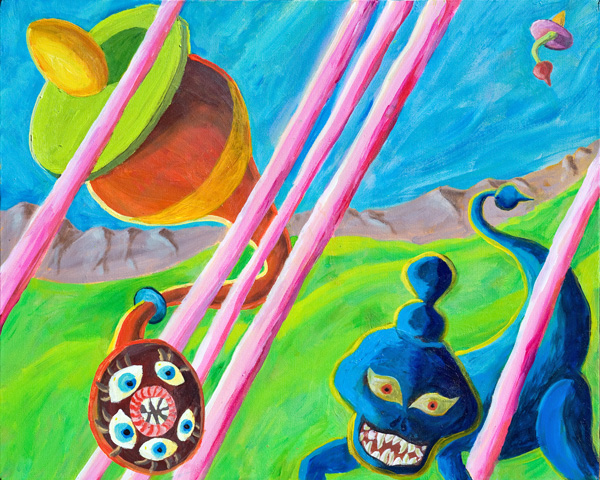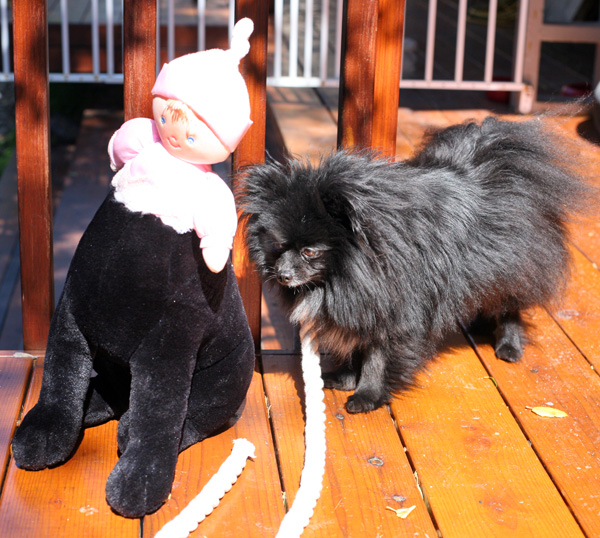I’m revising my novel Jim and the Flims this month, getting ready for a final push to the end. I haven’t taken any new pictures since last week, so I’ll just recycle some images from 2009.

In my novel, Jim is in the afterworld (called Flimsy), and he may or may not bring his dead wife Val back to life on Earth. It’s a take on the Orpheus and Eurydice legend, but I’m considering a happy ending, although I keep wondering if a “happily ever after” ending is best.
I gather that, in romance novels, the HEA ending (as they call it) is more or less mandatory. As the romance novel writer Janet Dean says on the writing-advice website Seekerville: Escape from Unpubbed Island: “What I love about romance novels is the guarantee of a happy ending. That’s why I read and write them.” But should I be following writing advice from such a source?
[Speaking of “unpubbed island,” I keep thinking about the stories of how the Inuit supposedly dispose of aged family members who become a burden. Eventually the same fate overtakes older writers. The editors put you on an ice floe with a hunk of blubber. “We’ll be in touch.”]

[Two alien flims: a jiva and a yuel, left to right.]
Back to my plot. What if my character Jim doesn’t in fact get his wife, Val, back at the end of the Jim and the Flims?
At a deep level, Jim and the Flims is about a man coming to terms with his grief over his wife’s death. So it might be a cop-out for Jim to get Val back. Maybe it’s enough if he travels through the whole process, and at the end he’s rounded off a grief cycle. Nobody ever comes back from the dead. You can’t ever go back to the happy person you used to be.

I’d guess that the grief process is the transreal theme of the Orpheus and Eurydice myth in the first place. Here’s a link to Vergil’s version in the Georgics, and here’s a link to the story in Ovid’s Metamorphoses.
Eurydice is bitten by a poisonous snake soon after her marriage to Orpheus. Orpheus goes down to the underworld and plays his lyre and garners some sympathy. He’s like, “It was unjust, it was too soon.” Pluto, the god of the underworld, gives him Eurydice and tells him to lead her out of the underworld, but not to look back. And, when Orpheus is almost out of the cave entrance, he looks back at his beloved, perhaps worried that she wasn’t following, and now she breathes the world, “Farewell,” and fades like smoke in the air. He never sees her again, and the keepers of the underworld won’t let him come back and try again.

Vergil says Orpheus was soon torn to shreds at a wild Bacchanal, and that his severed head floated down the river to the underworld, the head still calling out for Eurydice. Ovid says that Orpheus “was the first of the Thracian people to transfer his love to young boys, and enjoy their brief springtime, and early flowering, this side of manhood.”
In other words, our bereaved poet/singer turns alkie or gay! Gotta love it.
So what about Jim and the Flims? As a half-measure, I’d been entertaining the notion that Jim does in fact get Val back to Earth at the end—but then she frikkin’ divorces him! I was thinking of that as a post-modern twist.

Or maybe it’s heavier if Jim somehow can’t get Val to come back at all. It’s not so much that she wants to come and that he mistakenly he looks at her—like in the Orpheus an Eurydice myth. I think it’s rather that Val wants to go through the zero and start again. I’d need to prefigure this kind of predilection on Val’s part, or show her growing into this mind-set during her stay in Flimsy.
All this said, I might be outsmarting myself if I don’t just do the comfortable, reader-friendly thing and let Jim bring Val back. HEA! What I can do is make this a little hard for him. Like, Val initially doesn’t want to come, and maybe he has to talk her into it. Perhaps the scary ghost of Amenhotep’s mummy shows up near Flimsy’s core and, like, scares Val into Jim’s arms.









January 16th, 2010 at 8:03 pm
A very interesting question, and great you shared with the readership.
The post-modern approach (i.e. she comes back and they divorce) is interesting. In romance, there’s a corollary to the HEA rule: you don’t describe the HEA. You really can’t because it’s bound to be a let down. So continuing a romance at all (never mind the back-from-the-dead angle) is breaking the rules.
And of course breaking the rules is something you never want to do, unless of course it’s something you want to do.
January 17th, 2010 at 2:34 pm
Hey, Rudy. Thanks for the plug! Some might say bringing Val back to life so she and Jim can have a HEA ending would be contrived. But as the author, you can build a world where anything is possible. Good luck figuring out your ending, happy or otherwise. You know my vote. 🙂
January 17th, 2010 at 3:11 pm
I love it, when old stories get new endings.
greetings fram Munich
January 18th, 2010 at 5:40 am
doesn’t have to be a HEA, but maybe some sort of ‘hope’ is good.
“Home. I’ll go home. And I’ll think of some way to get him back. After all… tomorrow is another day. “
January 18th, 2010 at 2:26 pm
Hello Rudy. I’m sure you’ll figure something out. It’ll be gnarly. Have you ever read “The Medusa Frequency” by Russell Hoban?… It’s a very transreal book itself. One of the characters that keeps popping up is the disembodied head of Orpheus. When I was a wee little lad one of my favorite kids books -and one of my mom’s favorites to read to me- was “The Little Brute Family” also by Hoban.
Maybe after tackling this romance novel you can write and paint a kids transreal picture book.
January 20th, 2010 at 6:38 pm
Which emotions do you want your ending to appeal to? If you want to appeal to joy, then a HEA will do. And why not; HEA appeals to the Darwinian imperative; he gets her back to make babies with. Writing like that is as easy as sprinkling sugar on food.
But if you want to appeal to sublimity, the bittersweet elevation that feels so good you want to cry, then let me suggest this scene: they meet, they must part, she tells him to go and love another, which he does, for love of her. Her generosity, his resilience. No cop-out here; it simply describes the mourning process. It helps the story if there’s another female in the background ready and willing to catch him on the rebound.
Or how about this nasty twist on the HEA: in one Buster Keaton film (I forget which) the HEA is followed by a fast-foreward through the couple’s life, ending with then both dead and buried side-by-side. This is of course the ultimate violation of the don’t-describe-the-HEA rule.
My father was gleeful about that ending. He’d show it to me and laugh. That was his sense of humor. Now he’s dead too. I get it, Dad.
So whether or not Jim and Val get back to Earth, sooner or later they’ll be back in Flim. How’s that for fracturing a fairy tale?
January 21st, 2010 at 6:02 am
The theme of failing to get back the beloved from the underworld goes back way before Orpheus. Take the Epic of Gilgamesh, which is all about that theme, and is the oldest work of literature in history.
January 22nd, 2010 at 11:11 am
i like what you are doing. i have found that the greek myths lend themselves to multiple interpretations. perhaps he does bring her back, but she is changed, as you would expect, by the experience of the underworld. maybe she becomes more grim and cynical or perhaps more free and carpe diem. his ‘looking back’ could be the nostalgia, the wish for who she was before, who he had loved before and if he continues to look back he will lose her, changed woman as she is she will not tolerate it.
January 22nd, 2010 at 9:23 pm
and to add, the journey to the underworld is often said to symbolize psychological change, with the underworld being analogous to the unconscious mind. the snake the sting of knowledge or the unfolding of kundalini(depending on who you ask) and death irreversible change. so i dont know how you are writing it but perhaps it could also have a subtext of the changes we all go through and how in relationships we sometimes change apart and ‘looking back’ to the woman he fell in love with he loses her, but now im going off on a tangent aren’t i?
i would have to say though, that in my opinion in many cases the HEA ending can really ruin a story and undo the subtle meanings underlying the story by tying all of the threads into a knot just to end the story, and in other cases it is just appropriate to the story. my guess though is that being based on a tragic story it should hold some of that feeling.
torn apart in bacchanalia could also be translated into a self destruction through hedonism, in modern terms party till you drop, or in more positive symbolism a destruction in the manner of a drastic psychological change, a transcendental experience. his head torn off and resting near the mouth of the underworld, perhaps he becomes a celibate psychologist, head removed from body but in proximity to the underworld.
didn’t Orpheus play music to call the rising sun or something also, and have his own mystery school?
January 26th, 2010 at 3:46 am
I suppose in a worst case scenario, the anti-HEA, there is no closure, ending unknown, a sort non-ending…stop.
February 12th, 2010 at 5:38 pm
Justin Patrick said: “Maybe after tackling this romance novel you can write and paint a kids transreal picture book.” I was thinking the same thing!
April 23rd, 2010 at 1:46 pm
not at all is this a good story.